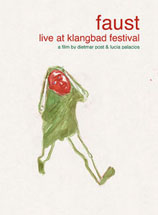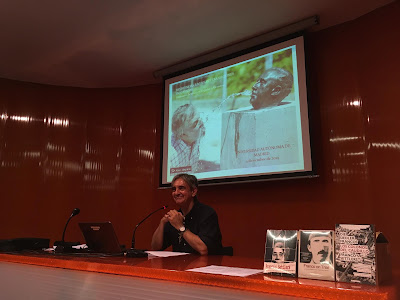SoundsXP.com REVIEWS KLANGBAD/FAUST DVD
Faust DVD twin film special: A Faustian pack | ||
You could come to these films cold, without any prior knowledge or background, ears and minds open. I suspect that this is something that Irmler/Klangbad would approve of; there is something free, experimental and downright unashamedly hippyish about the festival (which is non-corporate and sponsor-free), where anything seems to go. "Music is a form of communication" someone says. Throw away preconceptions, open yourself to possibilities, it seems to say. In 2005, the 3 day festival is small, with one stage set in a wood, people sleeping in tents or hammocks down by the stream, drinking German beer and eating sausages. There is a naiveness about it - of a bygone era - and of the performances themselves which vary widely. There's the doleful (Death in Vegas-ish) electronica of duo Minit, the 60/70s politico-art proclamation from Jutta Koether, Steven Lobdell bangin' a gong (or hubcap) through effects to create something trippy and transcendental, Cpt Howdy's take on american garage rock, Circle's mesmerising mishmash of groove and heavy/death metal with looks to match (bizarre), the country-like mix of reed organ, double-bass and slide guitar of Kamerflimmr Kollektief-Hausen, the acoustic folk of Scotland's The One Ensemble of Daniel Padden, and the art-school act of Nista Nije Nista, that walks the line between playful and silly and irritating (think Native Hipsters' 'There Goes Concorde Again') and when interviewed they all speak at once in their own languages without looking at each other, one points to the sky and says "Rainbow". And there IS a rainbow in the sky. What a way to end the film.
Among these, Faust (meaning 'Fist', as well connotations of Faustian pact with the Devil) emerged, becoming John Peel favourites and surprisingly popular (being picked up first by Polydor and then by the fledgling Virgin label), with an artful, playful but uncompromising approach to making music. This left the listener unsure where the music was going or where the sound came from. And perhaps it was no coincidence that it was Faust who responded to the Krautrock term by throwing it back at the British press with their mighty drone-based instrumental 'Krautrock' (Faust IV). Brilliant and awful music was made during this time. Whether it was brilliant or awful didn't seem to matter. It was the fact that it could be done. Is that a hippy or punk attitude? Does it matter? But good things come to an end and groups split (Neu! split and elements became La Dusseldorf and Harmonia), Can went from a prog to a funky groove, Kraftwerk abandoned their experimental edge for listener-friendly synth-pop, while Tangerine Dream became corporate behemoths (and in every student's collection alongside Pink Floyd). Faust quietly faded away. Punk came and went. New Romanticism, Mod/Ska revivals, Rough Trade, Acid, Madchester, Grunge all raised their heads and then nodded off (ok Indie still snoozes along). But then Faust re-emerged - as two groups. How contrary, but how Faust! Each Faust has original members: one version has the maverick duo of Diermaier and Péron whilst the other is headed by Hans Joachim Irmler. It is the Irmler Faust that released the 'Faust is Last' album earlier this year (and reviewed here on SoundsXP). Irmler has also remixed the re-issue of the one and only Faust 7" (originally released in 1972) 'So far/It's a bit of a pain' (said to be John Peel's favourite Faust track) to coincide with this DVD release (see separate review here). So to the Faust film (if you're doing the old linear viewing thing) of 6 tracks - Shiva, Beat That, Dschungelbar, Don't Look Back, Feurzeuge, Aggro - which build, fall apart, drone, clang, clatter, buzz; rhythm and noise jar and join together; it's intense and playful, ugly and beautiful. Ask current Faust member Steve Lobdell what Faust is and he says "Faust is more about ideas than music, more about process than songs". Ask me to recall what each track sounds like and I'd struggle: I have to go back and listen again, enjoying the moment. Like the unfussy camera work which captures it all; metal pipes being picked up and dropped, squeaky bird toys being squeezed rhythmically...and now I know where some of these sounds come from. Mad fun. And at the end Irmler smirks to the camera, "That was too loud, like beginners." The rejuvenating power of music... The Klangbad festival started small and is growing but still needs support. If you are interested in finding out more about the festival, or about Klangbad and its artists and recordings, including Faust, follow the links below. |




Comments